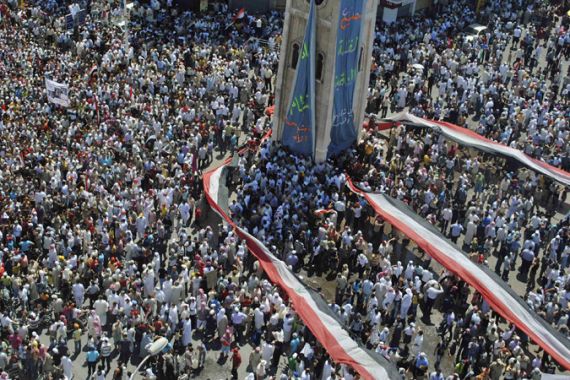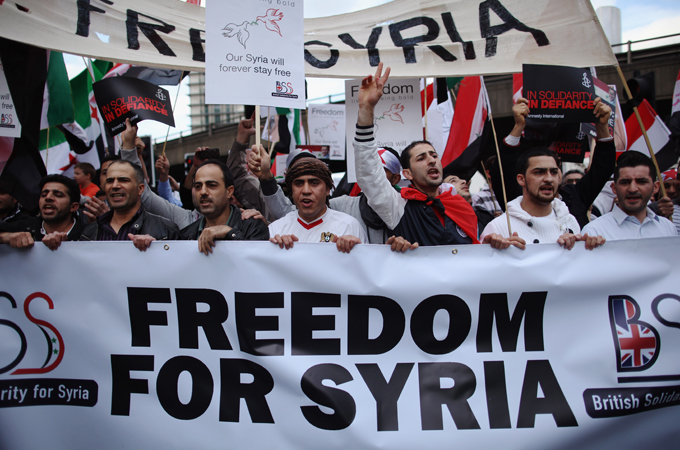Syria uprising: Key events
Syria is turning increasingly violent as the crackdown on protests continues and an armed opposition emerges.

 |
| President Bashar al-Assad is facing international condemnation of the bloody crackdown on protesters [GALLO/GETTY] |
The movement in Syria against the government of Bashar al-Assad first started following protests in the southern city of Deraa in March and has since spread across the country.
In the early stages, protesters were calling for reform and an end to corruption, but as demonstrations were met with live bullets, the rallies changed tone, calling for the fall of the government.
The United Nations says more than 4,000 people have been killed in the uprising and thousands of others arrested.
Key events in Syria’s protest movement:
Dec 7 – Assad denies ordering his troops to kill peaceful demonstrators, telling the US broadcaster ABC that only a “crazy” leader kills his own people.
Dec 5 – Syria says it has conditionally approved an Arab League peace plan. In a letter to the League, Syria rejects foreign interference and demands the annulment of sanctions plus reinstatement in the regional bloc.
Nov 27 – The Arab League agrees to impose economic sanctions on Syria.
Nov 21 – UN General Assembly’s Human Rights Committee condemns Syria for the crackdown, with 122 votes in favour, 13 against and 41 absentions.
Nov 20 – Rocket-propelled grenades hits a Baath Party building in Damascus. Syrian Free Army claims responsibility.
Nov 19 – Assad vows to pursue a crackdown on protests demanding his removal and says there will be parliamentary elections in February or March.
Nov 16 – Army defectors attacked an intelligence complex in the Damascus suburbs in what appears to be one of their boldest assaults so far against government security forces, Syrian activists said.
Nov 9 – Syrian protesters pelt four opposition leaders with eggs outside Arab League headquarters in Cairo, preventing them from entering the building for talks. The protesters were apparently against the men agreeing to a dialogue with the government.
Nov 2 – The Syrian government accepts several measures suggested by the Arab League aimed at halting the violence in the country, including the removal of tanks and armoured vehicles from the streets, the release of prisoners, and allowing the Arab League and media access to report on the situation.
Nov 1 – NATO Secretary-General Anders Fogh Rasmussen rules out the possibility of military intervention in Syria.
Oct 30 – Assad warns of an “earthquake” if the West intervenes in his country. In an interview with Britain’s Sunday Telegraph newspaper, he says international involvement would risk transforming Syria into “another Afghanistan”. He also stresses Syria is key to keeping the peace in the region.
Oct 16 – The Arab League announces that it plans to bring together Syria’s government and opposition groups to seek ways to end the violence in the country.
Oct 11 – Syria’s most senior Sunni Muslim cleric warns the US and Europe that his country would unleash suicide bomb attacks in their countries if they launched military strikes against Syria.
“I say to the whole of Europe, I say to America: We will prepare our suicide bombers who are already with you if you
bombard Syria or Lebanon,” Mufti Ahmad Hassoun, whose son was shot dead a week earlier, told a Lebanese delegation.
Oct 7 – Syria says that a national investigation is under way into killings, including those of 1,100 security forces, but denies allegations that loyalist forces had shot soldiers refusing to fire on protesters.
Russian President Dmitry Medvedev says Syria’s leaders should step down if they cannot enact reforms, but warns the West not to try to push President Assad from power.
Oct 4 – Russia and China join forces and veto a European-drafted UN Security Council resolution condemning Syria.
 |
| Assad took over the presidential office after his father Hafez died in 2000 [EPA] |
Oct 3 – Syrian opposition groups meet in Istanbul and reject foreign intervention but urge international action to stop what they call indiscriminate killings of civilians by the authorities.
Sep 29 – Assad supporters throw stones and tomatoes at US ambassador Robert Ford who is visiting centrist politician, Hassan Abdul-Azim, who has demanded an end to the crackdown.
Syria accuses the US of inciting violence against its security forces and says it will confront what it described as attempts to interfere in its domestic affairs.
Sep 15 – A group of Syrian activists form a Syrian National Council in Istanbul, Turkey, representing a united front in opposition to the Syrian government, marking the six-month anniversary of the beginning of the uprising.
Sep 10 – Nabil el-Araby, the head of the Arab League, says he has reached an “agreement on reforms” in Syria following talks with Assad.
Sep 2 – The EU adopts a ban on crude oil imports from Syria.
Sep 1 – The attorney general of Hama province says he has resigned over the crackdown on protesters. The authorities say his statement is “pure lies”.
Aug 27 – Arab foreign ministers meeting in Cairo urge the Syrian government “to follow the path of reason before it is too late”.
Aug 23 – Opponents of Assad meeting in Istanbul launch a “national council”.
Aug 21 – Assad warns against foreign military intervention in his country in an interview broadcast on state TV, saying: “Any action against Syria will have greater consequences [on those who carry it out], greater than they can tolerate”.
Aug 19 – A group of “revolutionary blocs” announces the formation of a coalition called the Syrian Revolution General Commission.
Aug 18 – US President Barack Obama and the EU call on Assad to step down.
Aug 9 – Ahmet Davutoglu, Turkey’s foreign minister, meets Assad in Damascus and calls for an end to the bloodshed.
Aug 7 – Saudi Arabia recalls its ambassador from Damascus, followed by Kuwait and Bahrain.
Aug 4 – Assad issues a decree authorising political parties.
Aug 3 – The UN Security Council condemns the crackdown in a statement.
July 31 – Security forces reportedly kill nearly 140 people, including 100 when the army storms Hama to crush dissent on the eve of Ramadan.
July 25 – The government adopts a draft law authorising the creation of political parties alongside the ruling Baath party.
July 18 – Qatar closes its embassy in Damascus after it is attacked by Assad loyalists
July 15 – More than a million people take to the streets, according to activists.
July 10 – The main opposition groups boycott talks with the government and say they will not negotiate till Assad stops the violent crackdown and frees thousands of political prisoners.
June 27 – Syrian intellectuals call for sweeping political change at a rare conference allowed by the authorities.
June 20 – In his third speech since protests began, Assad pledges to pursue a national dialogue on reform. Assad says dialogue could lead to a new constitution and even end his Baath party’s monopoly on power, but refuses to reform Syria amid “chaos”.
June 17 – Syrian tycoon Rami Makhlouf, a cousin of the president who to many Syrians give the widespread corruption a face, says he is quitting business.
|
|
June 12 – Armed forces take control of Jisr al-Shughour as thousands of residents flee to Turkey. More than 12,000 people flee to neighbouring Turkey in the following week.
June 6 – State television says 120 security personnel have been killed in an ambush. Activists later say the deaths were a result of a split within the security forces.
June 3 – Security forces kill at least 63 protesters around Syria, including 53 in Hama, human rights groups say.
Apr 29 – The US decides to impose new sanctions on Syria’s intelligence agency and two relatives of Assad.
Al Jazeera journalist Dorothy Parvaz goes missing upon arrival at Damascus airport. She is later deported to Iran, where she is held until May 18.
Apr 25 – Syrian troops backed by tanks begin and 11-day siege of Deraa.
Apr 23 – At least 75 people are reportedly killed in Syria in the bloodiest day since the uprising began.
Apr 21 – Assad issues decrees to end nearly five decades of emergency law and to abolish much-criticised security courts. Opposition figures, however, are sceptical.
Apr 16 – After swearing in the new cabinet, Assad gives a televised address for the second time since protests began, pledging further reforms.
Apr 14 – Adel Safar, a former agriculture minister, is named as prime minister in the new government.
President Assad orders the release of hundreds of protesters detained over the past couple of weeks but says those who committed crimes “against the nation and the citizens” would remain in jail.
Apr 7 – Assad issues a decree granting nationality to thousands of Kurds.
Apr 6 – The president announces decisions to close the country’s only casino and to scrap a ruling that banned teachers from wearing the niqab.
Apr 1 – Four people are reportedly killed after government forces use live fire against protesters in the Damascus suburb of Douma.
|
President Assad blames the unrest on foreign conspirators in a televised address |
Mar 30 – Assad delivers a speech for the first time since the protests began. He blames foreign conspirators for the unrest but declines to elaborate on major reforms.
Mar 29 – The government resigns.
Mar 23 – Syrian forces reportedly kill six people in an attack on protesters in the Omari mosque complex in Deraa, and later open fire on hundreds of youths marching in solidarity.
An official statement says later that Assad has sacked Faisal Kalthoum as governor of Deraa.
Mar 22 – Hundreds of people march in Deraa and nearby Nawa demanding freedom. It is the fifth straight day of demonstrations challenging the government.
Mar 20 – Crowds set fire to the headquarters of the ruling Baath Party in Deraa. Marchers chant “No, no to emergency law. We are a people infatuated with freedom!”.
Mar 18 – Security forces kill three protesters in Deraa, residents of the southern city say. The demonstrators were taking part in a peaceful protest demanding political freedoms and an end to corruption in Syria. The protest was triggered by the arrest of teenagers writing anti-government graffiti on walls.
Smaller protests take place in the central city of Homs and the coastal city of Baniyas.
Mar 16 – Security forces break up a silent gathering in Marjeh square in Damascus of about 150 protesters who hold up pictures of imprisoned relatives and friends. Witnesses told rights group Amnesty International at least 30 people were arrested.
Mar 15 – Dozens march in Damascus after a Facebook page call for a “Day of Dignity”.